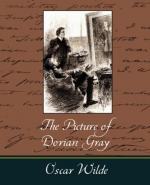But he never fell into the error of arresting his intellectual development by any formal acceptance of creed or system, or of mistaking, for a house in which to live, an inn that is but suitable for the sojourn of a night, or for a few hours of a night in which there are no stars and the moon is in travail. Mysticism, with its marvellous power of making common things strange to us, and the subtle antinomianism that always seems to accompany it, moved him for a season; and for a [69] season he inclined to the materialistic doctrines of the Darwinismus movement in Germany, and found a curious pleasure in tracing the thoughts and passions of men to some pearly cell in the brain, or some white nerve in the body, delighting in the conception of the absolute dependence of the spirit on certain physical conditions, morbid or healthy, normal or diseased. Yet, as has been said of him before, no theory of life seemed to him to be of any importance compared with life itself. He felt keenly conscious of how barren all intellectual speculation is when separated from action and experiment. He knew that the senses, no less than the soul, have their mysteries to reveal.
And so he would now study perfumes, and the secrets of their manufacture, distilling heavily-scented oils, and burning odorous gums from the East. He saw that there was no mood of the mind that had not its counterpart in the sensuous life, and set himself to discover their true relations, wondering what there was in frankincense that made one mystical, and in ambergris that stirred one’s passions, and in violets that woke the memory of dead romances, and in musk that troubled the brain, and in champak that stained the imagination; and seeking often to elaborate a real psychology of perfumes, and to estimate the several influences of sweet-smelling roots, and scented pollen-laden flowers, of aromatic balms, and of dark and fragrant woods, of spikenard that sickens, of hovenia that makes men mad, and of aloes that are said to be able to expel melancholy from the soul.
At another time he devoted himself entirely to music, and in a long latticed room, with a vermilion-and-gold ceiling and walls of olive-green lacquer, he used to give curious concerts in which mad gypsies tore wild music from little zithers, or grave yellow-shawled Tunisians plucked at the strained strings of monstrous lutes, while grinning negroes beat monotonously upon copper drums, or turbaned Indians, crouching upon scarlet mats, blew through long pipes of reed or brass, and charmed, or feigned to charm, great hooded snakes and horrible horned adders. The harsh intervals and shrill discords of barbaric music stirred him at times when Schubert’s grace, and Chopin’s beautiful sorrows, and the mighty harmonies of Beethoven himself, fell unheeded on his ear. He collected together from all parts of the world the strangest instruments that could be found, either in the tombs of dead nations or among the few savage tribes that




